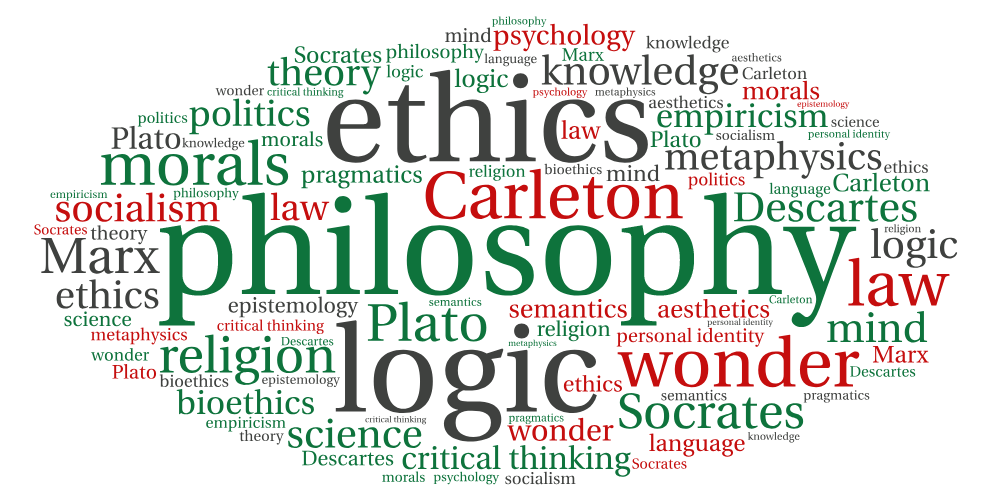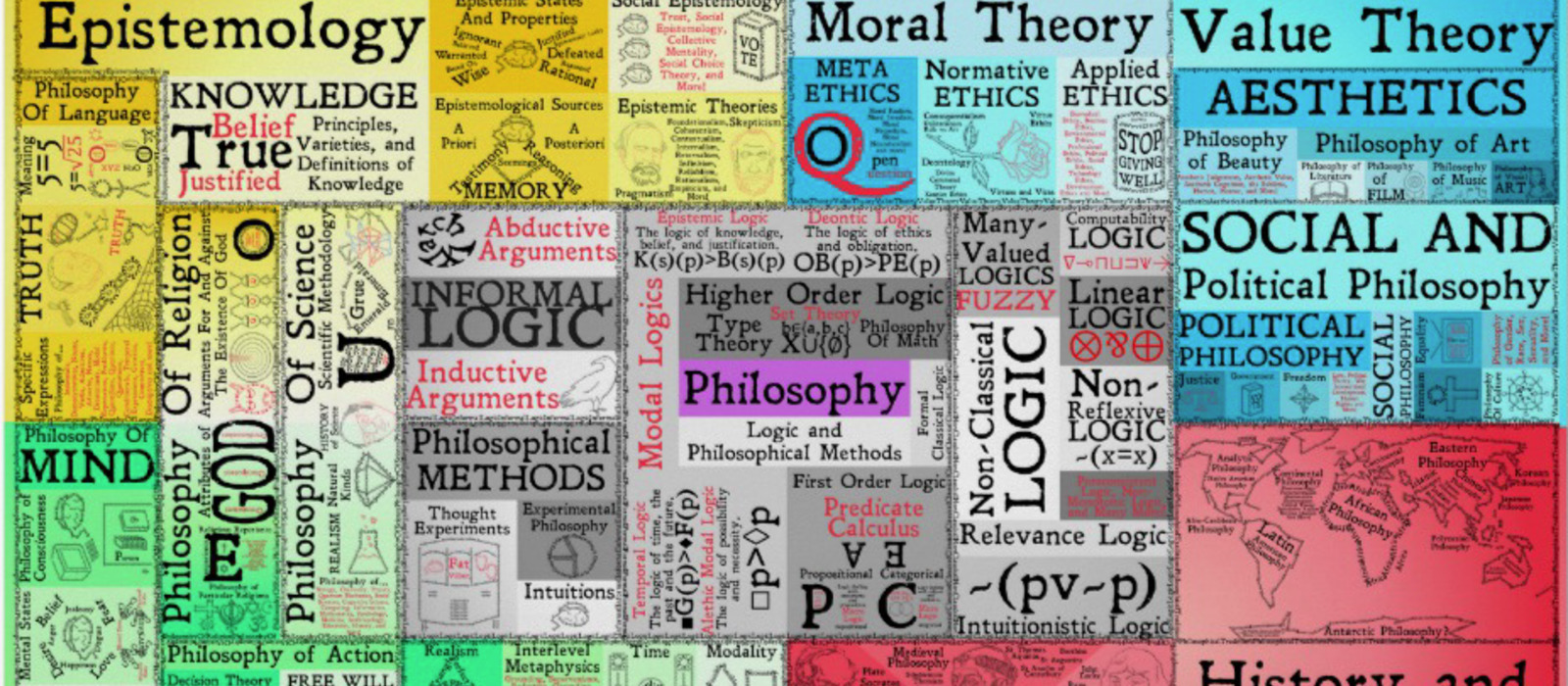What is Philosophy?
We all think of the world and our place in it in a unique way. To do so, however, we rely on general ideas shared by all such as the self, knowledge, truth, reality, time, nature, the supernatural, the division between mind and body, language, freedom, happiness, the good, responsibility, love, etc. Most of the time, these ideas appear obvious to us.
Rarely do we get the time or opportunity to reflect on these ideas. Philosophy provides us with just this opportunity.
Academic philosophy is divided in different branches. Some of them take us far from the sphere of ordinary experience. This is the case of metaphysics, which questions our conception of ‘reality’, or epistemology, which explores the nature of knowledge. Others focus on issues we struggle with on a daily basis, such as ethics, the branch of philosophy which explores the conditions of happiness, the nature of values, and our conceptions of ‘right’ and ‘wrong’.
Critical thinking and the study of logic traditionally play an important role in philosophy because they teach us how to reason well. The history of the discipline also plays a central role in a training in philosophy, because it is often by examining the insights (and insightful mistakes) of past thinkers that we are inspired to come up with our own insights in the exploration and assessment of ideas.

Curious to learn more?
Try one of our introductory philosophy courses without prerequisites, including:
- PHIL 1000: Introductory Philosophy: Fields, Figures and Problems
PHIL 1000 [0.5 credit]
Introductory Philosophy: Fields, Figures and Problems
What is metaphysics? Who was Socrates? What is Freedom? This introduction sketches many branches of philosophy and the important problems associated with each. It introduces great philosophers, present and past, and traces enduring philosophical themes.
Precludes additional credit for FYSM 1208 (no longer offered),
FYSM 1211 and
PHIL 1100. This course is not suitable for students with previous formal study of philosophy.
- PHIL 1200: The Meaning of Life
PHIL 1200 [0.5 credit]
The Meaning of Life
An introduction to concerns expressed by the perennial philosophical question, “What is the meaning of life?” Students will be familiarized with the major philosophical approaches to life’s meaning through a consideration of various contemporary and late modern works in the philosophy of life.
Lectures three hours a week.
- PHIL 1301: Mind, World, and Knowledge
PHIL 1301 [0.5 credit]
Mind, World, and Knowledge
Introduction to a variety of philosophical works, including contemporary, on such topics as: the nature of being, the mental, the external, consciousness, perception, experience, meaning, truth, the nature of knowledge, scientific understanding, and how language and thought represent the world.
Precludes additional credit for PHIL 1006 (no longer offered), PHIL 1501 (no longer offered).
Lectures three hours per week.
- PHIL 1550: Introduction to Ethics and Social Issues
PHIL 1550 [0.5 credit]
Introduction to Ethics and Social Issues
An introduction to understanding, assessing, and formulating ethical arguments concerning controversial issues. Particular issues studied, such as world hunger, capital punishment, abortion, animal rights, terrorism, may vary each time the course is offered.
- PHIL 1700: Philosophy of Love and Sex
PHIL 1700 [0.5 credit]
Philosophy of Love and Sex
A survey of philosophical classics, on themes of romantic love, self-love, altruistic love, sexuality, eroticism and the passion/reason dichotomy, from Plato’s Symposium to Foucault’s History of Sexuality; and an examination of related contemporary issues in light of these perspectives.
Lectures three hours a week.
- FYSM 1210: First Year Seminar, Special Topics
-
FYSM 1210 [0.5 credit]
First Year Seminar, Special Topics
Selected topics in the study of philosophy. Topics offered may vary from year to year and will be announced in advance of the registration period by the Department of Philosophy.
Prerequisite(s): normally restricted to students entering the first year of a B.A., B.Cog.Sc., B.Co.M.S., B.Econ. or B.G.In.S. program.
Seminars three hours a week.
- PHIL 2001: Introduction to Symbolic Logic
-
PHIL 2001 [0.5 credit]
Introduction to Symbolic Logic
An introduction to the techniques and philosophical implications of formal logic with emphasis on translation of expressions into symbolic form, testing for logical correctness, the formulation and application of rules of inference, and the relation between logic and language.
Lectures three hours a week. Open to first-year students.
- PHIL 2003: Critical Thinking
-
PHIL 2003 [0.5 credit]
Critical Thinking
Assessment of reasoning and the development of cogent patterns of thinking. Reference to formal logic is minimal. Practice in criticizing examples of reasoning and in formulating one’s own reasons correctly and clearly.
Lecture three hours a week. Open to first-year students.
- PHIL 2330: Happiness, Well-being, and the Good Life
PHIL 2330 [0.5 credit]
Happiness, Well-being, and the Good Life
A philosophical exploration of what makes a good human life. Topics may include the role of happiness, well-being, and flourishing in a good life, the relations between these aspects, and the extent to which they depend on luck and social considerations
Lectures three hours a week. Open to first-year students.
- PHIL 2340: Philosophy and Popular Culture
-
PHIL 2340 [0.5 credit]
Philosophy and Popular Culture
Philosophy is all around us, it permeates culture. This course explores philosophical questions through the lens of popular culture. The material used may include films, shows, music, novels, video games, advertising, comic books, and so on.
Lectures three hours a week. Open to first-year students.
- PHIL 2380: Introduction to Environmental Ethics
-
PHIL 2380 [0.5 credit]
Introduction to Environmental Ethics
Major questions in environmental ethics: How should human beings view their relationship to the rest of nature? Is responsible stewardship of the environment compatible with current technology? Must future generations be protected? Do animals, other life forms, endangered species, ecosystems and/or the biosphere have value/rights?
Precludes additional credit for PHIL 1804. Open to first-year students.
- PHIL 2807: Philosophy of Art
-
PHIL 2807 [0.5 credit]
Philosophy of Art
Philosophical approaches to the study of art. Topics such as: the nature of art and artistic value; representation and symbolism in art; art and artifice; art and the emotions; art, culture and ideology; post-structuralism and art; theories of creativity; relationship between artworks and audiences.
Lectures three hours a week. Also listed as ARTH 2807.
Click here for a full list of courses in the Department of Philosophy
Share: Twitter, Facebook
Short URL:
https://carleton.ca/philosophy/?p=6759

